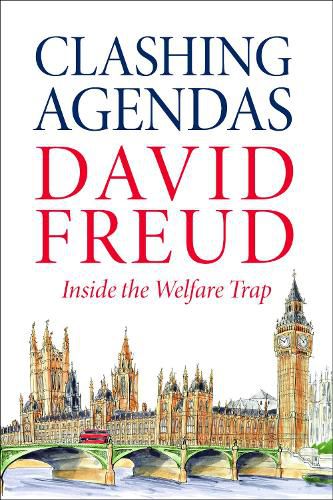Readings Newsletter
Become a Readings Member to make your shopping experience even easier.
Sign in or sign up for free!
You’re not far away from qualifying for FREE standard shipping within Australia
You’ve qualified for FREE standard shipping within Australia
The cart is loading…






The introduction of Universal Credit arguably stands as the most far-reaching reform so far this century. Clashing Agendas is the traumatic inside story of how this simple concept became unimaginably complicated in execution, and then nearly self-destructed, told by David Freud, who was the Minister for Welfare Reform responsible for the transformation. David’s initial welfare proposals in 2007, commissioned by the Labour Prime Minister Tony Blair in one of his last political initiatives, proved popular across all political parties. When the Conservatives came calling, David Freud accepted the job of reforming the system, initially in the shadow ministerial team and then in Government. His core motivation was to end the welfare trap, by which the legacy systems made it difficult for many people to free themselves from dependency on the state.
This personal account reveals the complex interplay between politicians and civil servants - the true determinant of how Government really works. It concludes with his views both on future development of the welfare system and on how the UK Government might organise itself to introduce major system reforms more successfully in future.
$9.00 standard shipping within Australia
FREE standard shipping within Australia for orders over $100.00
Express & International shipping calculated at checkout
The introduction of Universal Credit arguably stands as the most far-reaching reform so far this century. Clashing Agendas is the traumatic inside story of how this simple concept became unimaginably complicated in execution, and then nearly self-destructed, told by David Freud, who was the Minister for Welfare Reform responsible for the transformation. David’s initial welfare proposals in 2007, commissioned by the Labour Prime Minister Tony Blair in one of his last political initiatives, proved popular across all political parties. When the Conservatives came calling, David Freud accepted the job of reforming the system, initially in the shadow ministerial team and then in Government. His core motivation was to end the welfare trap, by which the legacy systems made it difficult for many people to free themselves from dependency on the state.
This personal account reveals the complex interplay between politicians and civil servants - the true determinant of how Government really works. It concludes with his views both on future development of the welfare system and on how the UK Government might organise itself to introduce major system reforms more successfully in future.